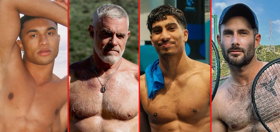
When speaking to Jaiyah Saelua, the groundbreaking athlete wants to make one point clear: she lives a privileged existence.
And most of all, she credits her Samoan heritage and upbringing.
Saelua made sports history when she became the first out transgender athlete to compete at the World Cup level. Saelua played for the American Samoan national team, considered the the worst club in the world. During the 2002 World Cup Qualifiers, Australia routed American Samoa 31-0, the largest margin of victory in soccer history.
Nine years later, American Samoa was once again vying for a World Cup spot, and were major underdogs. Their first qualifier for the 2014 World Cup was against Tonga, another small Pacific island.
Miraculously, they won!
Next Goal Wins, which will be released Friday, is a heartwarming comedy that tells the triumphant story of American Samoa’s most unlikely victory. With Dutch coach Thomas Rongen at the helm, the U.S. territory won its first game ever
That’s right: ever!
Directed by Academy Award winner Taika Waititi (Jojo Rabbit, Thor: Ragnarok), Next Goal Wins first hit theaters as a documentary in 2014. This upcoming version tells the same inspiring story, except with major Hollywood backing.
Michael Fassbender stars as Rongen, the downtrodden soccer coach on his last professional legs. Several actors of Samoan descent are cast in leading roles, and the cast also includes Elisabeth Moss and Will Arnett.
One of those Samoan actors, Kaimana, portrays Saelua in her on-screen debut. Like Saelua, Kaimana is a member of the fa’afafine, a third gender widely accepted in Samoan society.
A role player, Saelua arose to stardom and became one of the team’s most valuable places in its World Cup quest. She’s enjoyed a rewarding athletic career that spans over 20 years, and believes it only could’ve happened in a place like American Samoa.
There, fa’afafine are celebrated as part of Samoa’s rich culture, and not demonized.
Queerty recently caught up with Saelua to talk about being portrayed in a major motion picture, receiving the “Hollywood treatment” and keys to sustaining a two-decade athletic career. Here’s what she had to say…
QUEERTY: What kinds of messages do you receive on social media?
JAIYAH SAELUA: People have been so receptive to my story. I think a lot of the messages I’m getting are positive, because my story is different in a way that I fit in with opposite narratives. For the LGBTQ+ community, I’m visible and out there living my truth. But also, I’m a trans woman who plays on a men’s team, so I feel safe in the idea that my experiences since the journey began, and the messages I get on social media, are just supportive and positive. You can’t say the same thing for transgender women who pursue women’s sports.
How large of a factor do you think that is in the perception of your story?
I was nurtured and raised in a culture that has a place for fa’afafine. We’re recognized and respected in our society. We have four fa’afafine, two of them trans, who played for the American Samoan national volleyball team, who are on their way to the Pacific Games in the Solomon Islands, where there are a myriad of athletes like myself. They played for their countries’ national teams. We come from a different world, so we can’t equate our experiences to those of trans women who venture into women’s sports.I can’t speak on their behalf, because those are not my experiences.
It’s pretty amazing that Samoa embraces fa’afafine people.
It’s unique to Samoa in its term and cultural significance, but not unique to indigenous cultures around the world. The literal translation of fa’ afafine is “in the manner of a woman,” so we understand that suggests we are not women, but we are also not your regular man. We understand we are both. We will forever be associated with the male identity, because it was assigned to us at birth, but we will also be associated with the female identity, because it’s in our mannerisms. It’s just how we prefer to live our lives.
Explaining it can seem very controversial, but it’s only because you’re viewing it from an outside lease. Us, who live these experiences, we live pretty comfortably.
What did you think of Next Goal Wins?
I loved it! Taika was kind enough to give Jaiyah — played by Kiamana — a much bigger role than I actually had in the documentary. In the doc, I was one story of many different stories that made the story flow. But in Next Goal Wins, Jaiyah is really put in the forefront of the story, and it’s so beautiful the way the sensitivities of the fa’afafine identities are seen and celebrated. But also, the struggles and traumatizing experiences of trans women are [observed] in the movie. Those things are very accurate to my own experiences. I’ve gone through all of the things that Kaimana has gone through when I started my transition, but I’ve always lived a very comfortable life. You see both of those worlds. It’s a beautiful portrayal.
What are some of the coolest experiences you’ve had promoting the movie?
Oh my gosh! It’s been so surreal. The Hollywood treatment in and of itself is an experience. But just to realize that my story, the story of the fa’afafine identity, the Samoan people, my team, is going to be magnified in a way none of us could’ve imagined. These things just don’t happen to us. It’s pretty special to see.
What do you like to do for fun?
You can ask me that off camera! A lot of things: play soccer, eat pizza, watch movies, go out to the clubs, hang with friends. Travel!
You’ve had such a long and successful career! How do you stay in shape?
It’s been over 20 years! But I play as much football as I can. I’m not the healthiest person; and to be real, you don’t need to be in a lot of good shape to play on the American Samoan national team! But of course, it is at a national level, so we watch what we eat, we workout as much as we can. But I just don’t like the whole gym scene. I’d rather just do what I need to stay fit on the football field with a net there.
What’s next for you?
This movie is the pinnacle of what has been a more than 10-year journey with Next Goal Wins. This is me reaching the peak of the mountain.
But after that, we have the World Cup qualifiers next year. We start training for that as soon as the team gets back from the Pacific Games. But I’ve been taking courses for coaching. By the time I do retire as an athlete, I want to coach the women’s national team or youth national team, so I’m still involved in the sport in some way.






















Openminded
If I read and understood the article correctly, she plays on the men’s team, so before you trans haters start the hate, realize that she is thriving while NOT playing against other women. This is a very interesting life she is living and I don’t believe anyone can criticize her for it.
ShaverC
Yes, the writer dances around that point. Proper team = no concerns.
LumpyPillows
Agreed, this shows how trans women can compete in sports without marginalizing women.
dbmcvey
I love how conservatives pretend they care about women’s sports, when in reality they don’t. They were always opposed to Title IX, but now they’re so concerned.
The reality, of course, is that they don’t care about girl’s sports, they just hate trans women.
ShaverC
dbmcvey, Your virtue signal is loud and clear.
dbmcvey
So is yours Shaver. You don’t care about women’s sports unless it aids you in your hate of trans people.
dbmcvey
Very cool! Live your best life!
LumpyPillows
Oh, no! We agree on a trans article.